In a significant development surrounding the ongoing discourse about technology and national security, former US President Donald Trump is set to meet with Shou Zi Chew, the CEO of the widely popular social media platform TikTok. This encounter takes place amid mounting pressure on TikTok, a platform owned by the Chinese company ByteDance, due to legal challenges and an impending ban that the US government aims to enforce. As tensions rise and the deadline to address the situation approaches, this meeting could potentially shape the future of the app in the American market.
On the calendar for Monday, January 18, Trump will engage with Chew at his Mar-a-Lago estate in Florida. The urgency of this meeting is underscored by a law that has recently been enacted, mandating that TikTok must either be sold or subjected to a ban by January 19. This deadline looms particularly large, as the social media company has already submitted an emergency application to the US Supreme Court, seeking to postpone the enforcement of the ban and provide room for a judicial review. By making this plea, TikTok attempts to navigate an increasingly hostile legislative landscape and preserve its presence in the United States.
The rationale behind this aggressive move from the US government lies in the alleged ties between ByteDance and the Chinese government—claims that both TikTok and its parent company have consistently denied. The legislation that ushered in these stringent measures is aimed squarely at protecting the national security of the United States from what it describes as threats posed by foreign-controlled applications. The impact of such a ban could be profound, affecting not only TikTok’s operations but also its vast number of users who engage with the platform consistently.
Interestingly, Trump’s stance on the issue appears to have evolved since his initial term in office. While he previously supported a ban on TikTok, he has recently expressed opposition to the current prohibition, citing concerns that it may inadvertently benefit Facebook. Trump has vocally criticized Facebook in the past, suggesting that the platform played a role in his defeat during the 2020 presidential election, a sentiment that adds complex layers to his present-day approach toward TikTok.
The timing of Trump’s potential re-entry into the presidency is also pivotal, as he will not take office again until January 20, a mere day after the ban’s deadline. This situation adds urgency to Chew’s meeting with Trump, as it represents TikTok’s last-ditch effort to secure a favorable ruling or delay. In their filing with the high court, TikTok characterizes itself as “one of the most significant speech platforms” in the United States and warns that immediate enforcement of the ban could inflict irreparable harm to the company and its users.
As part of the larger narrative, TikTok’s previous attempt to have the legislative ban overturned was rejected by a federal appeals court. The appellate court’s ruling held that the law was the culmination of extensive work from both Congress and successive administrations, hinting at a bipartisan consensus regarding the implications of foreign-owned digital platforms on American policy and security.
In light of these developments, Trump publicly acknowledged during a Monday press conference that his administration would “take a look at TikTok.” He further stated, “I have a warm spot in my heart for TikTok, because I won youth by 34 points,” a reference to his appeal to younger voters. Notably, while a significant portion of the 18 to 29 demographic had traditionally leaned toward Democrats, there has been a noticeable shift in opinions favoring Trump compared to elections past.
Adding to the interest surrounding the meeting, Trump’s foray into TikTok began only in June, yet he managed to amass millions of followers during the campaign period. His new engagement with TikTok, coupled with the platform’s precarious predicament, highlights the intricate relationship between technology, politics, and societal dynamics in today’s rapidly evolving media landscape.
Thus, the imminent meeting between Trump and Chew not only reflects TikTok’s quest for survival amid legal turbulence but also signals the potential for a strategic pivot in how the US administration engages with significant tech entities in the future. The outcome of this meeting and the subsequent judicial considerations could have lasting ramifications not only for TikTok but also for the broader ecosystem of digital platforms navigating the complex geopolitical tensions of our time.



